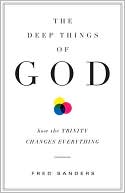21 But now the righteousness of God has been manifested apart from the law, although the Law and the Prophets bear witness to it— 22 the righteousness of God through faith in Jesus Christ for all who believe. For there is no distinction: 23 for all have sinned and fall short of the glory of God, 24 and are justified by his grace as a gift, through the redemption that is in Christ Jesus, 25 whom God put forward as a propitiation by his blood, to be received by faith. This was to show God's righteousness, because in his divine forbearance he had passed over former sins. 26 It was to show his righteousness at the present time, so that he might be just and the justifier of the one who has faith in Jesus.
27 Then what becomes of our boasting? It is excluded. By what kind of law? By a law of works? No, but by the law of faith. 28 For we hold that one is justified by faith apart from works of the law. 29 Or is God the God of Jews only? Is he not the God of Gentiles also? Yes, of Gentiles also, 30 since God is one—who will justify the circumcised by faith and the uncircumcised through faith. 31 Do we then overthrow the law by this faith? By no means! On the contrary, we uphold the law. (Romans 3:21-31)
This text really portrays the heart of the gospel as well as any text in the Bible. If you are like me, you’ve read over this text, or at least parts of this text, so many times it doesn’t stun you like it should. Take the absurdity of these back to back statements. First “for all have sinned and fall short of the glory of God,” which is immediately followed up by “and are justified by his grace as a gift, through the redemption that is in Christ Jesus.” You are sinner, and therefore you are redeemed. That’s not the way our logic tends bend, but maybe it should.
Absurdity of Redemption - Redemption is a very vogue word. We love the idea that someone can be redeemed, that there is hope even for the most miserable among us. And well we should love such a notion. Nevertheless, we tend to undermine this beautiful and precious hope. Some of us tend to view the world through a very strict, judgmental lens. God is holy and doesn’t tolerate human perversion even in its mildest forms. Others tend to view the world through a very open, free-spirited lens. God is loving and overlooks our mistakes. Both of these views will undermine redemption. The strict view says that God only accepts those that get it together. But if you got it together, you are hardly in need of redemption. This view then effectively eliminates the need or possibility of redemption. God judges the bad (no redemption for them) and accepts the good (past the need for redemption). The open view is equally destructive of redemption. Our mistakes really don’t require any just response of punishment from God. If God just accepts us as we are, then no change is required. Redemption, by its very definition, is a fundamental change. Thus, in the open view God doesn’t redeem because there is simply no need for it.
Just and Justifier - The only way redemption makes sense is if God is, as Paul says, both “just and the justifier.” That is, God is both terribly strict and holy and at the same time extraordinarily gracious and loving. Both the strict view and the open have the same problem when it comes to redemption. They both look to man and his quality for hope. Paul, however, looks to God and his quality. Men are evil beyond what they could ever dream, and yet God offers them a righteousness beyond what they could ever hope for. It’s not a righteousness that comes from following rules or moral conformity. It is the very righteousness of God (3:22). God hates sin and judges it, but in absolute love and mercy he judges not us but his own Son (3:25).
No Boasting - The path to true redemption is the path of faith. It is not the path of moral competency and individual effort. That is, it is not the path of leaning upon one’s own decisions and strength. Instead, it is the path of trusting God, trusting that he has punished his Son instead of us, and trusting that we are accepted on his behalf and not our own. This path of faith is the only path to true humility. If you are accepted because you’ve reformed, then you take pride in your reformation. If you are accepted because you really aren’t that bad, then you take pride that you really aren’t in need of redemption. It is only when you are worthy of God’s judgment and yet freely receive redemption because Christ took your punishment that you can be free of boasting.









No comments:
Post a Comment